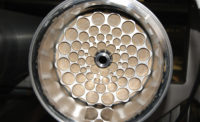Toray develops hollow fiber membrane module with nano-structural control
Toray draws on its hollow fiber membrane technology for water treatment to expand its lineup of hollow fiber membrane modules for food, beverage and bio-related applications.

Toray Industries developed a high-precision hollow fiber membrane module for food and beverage production and bio-related applications.
The offering employs the company’s nano-pore structural control technology. It retains the high heat resistance and permeability needed for these applications with its pore size, or molecular weight cut-off, reduced to around one-quarter that of Toray’s conventional counterparts. This enhances recovery rates and concentration ratios for proteins and polysaccharides with a broad range of molecular weights to streamline processes. Additionally, this technology can help to reduce carbon dioxide emissions and manufacturing costs.
The company has drawn on the hollow fiber membrane technology it has cultivated for water treatment to expand its lineup of hollow fiber membrane modules for food, beverage and bio-related applications. These products feature an outside-in module, with the following advantages over inside-out module counterparts used for these applications: wide flow channels for feed liquid, a proprietary composite hollow fiber membrane structure, and high resistance against steam and hot water up to 125 degrees Celsius. As a result, to concentrate liquids that are highly turbid or viscous, this setup makes it possible to shift from conventional thermal concentration methods to membrane-based concentration.
In recent years, customer demand has grown for technologies, including those for functional foods, that concentrate proteins and polysaccharides to lower production costs and create new products.
Toray has started shipping samples to customers, several of whom are conducting assessments.
Looking for a reprint of this article?
From high-res PDFs to custom plaques, order your copy today!






